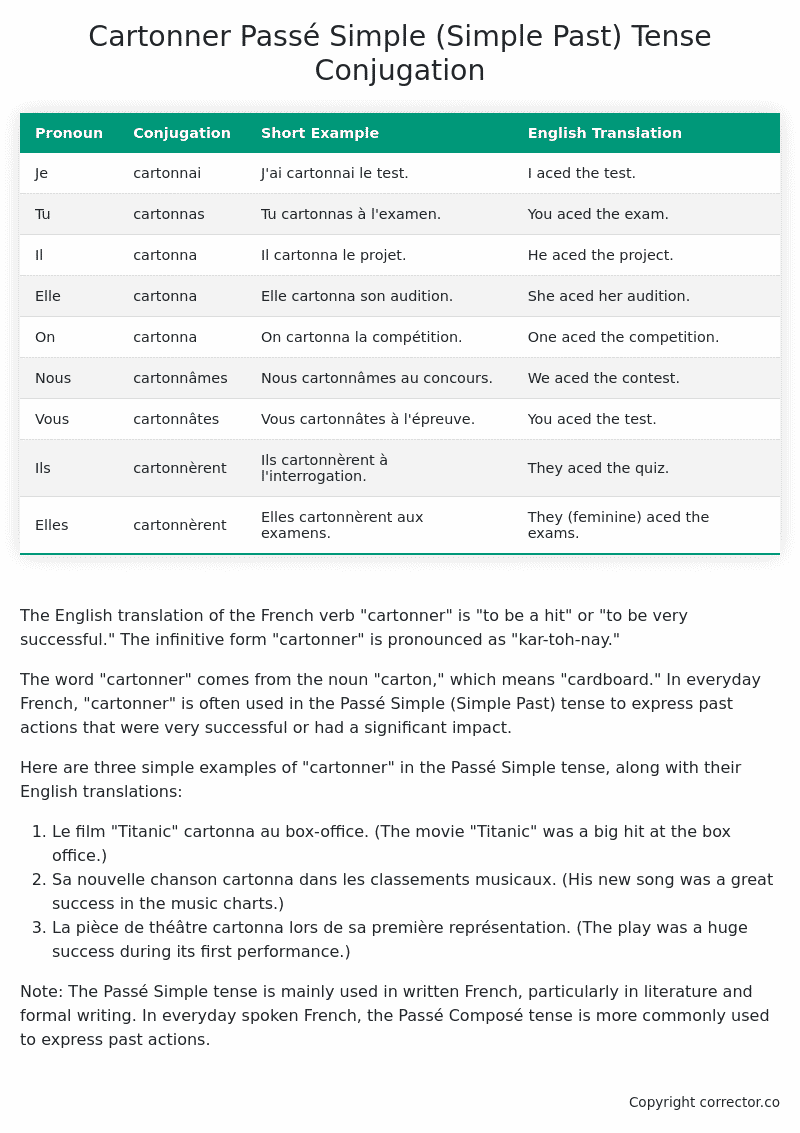Passé Simple (Simple Past) Tense Conjugation of the French Verb cartonner
Introduction to the verb cartonner
The English translation of the French verb “cartonner” is “to be a hit” or “to be very successful.” The infinitive form “cartonner” is pronounced as “kar-toh-nay.”
The word “cartonner” comes from the noun “carton,” which means “cardboard.” In everyday French, “cartonner” is often used in the Passé Simple (Simple Past) tense to express past actions that were very successful or had a significant impact.
Here are three simple examples of “cartonner” in the Passé Simple tense, along with their English translations:
- Le film “Titanic” cartonna au box-office. (The movie “Titanic” was a big hit at the box office.)
- Sa nouvelle chanson cartonna dans les classements musicaux. (His new song was a great success in the music charts.)
- La pièce de théâtre cartonna lors de sa première représentation. (The play was a huge success during its first performance.)
Note: The Passé Simple tense is mainly used in written French, particularly in literature and formal writing. In everyday spoken French, the Passé Composé tense is more commonly used to express past actions.
Table of the Passé Simple (Simple Past) Tense Conjugation of cartonner
| Pronoun | Conjugation | Short Example | English Translation |
|---|---|---|---|
| Je | cartonnai | J’ai cartonnai le test. | I aced the test. |
| Tu | cartonnas | Tu cartonnas à l’examen. | You aced the exam. |
| Il | cartonna | Il cartonna le projet. | He aced the project. |
| Elle | cartonna | Elle cartonna son audition. | She aced her audition. |
| On | cartonna | On cartonna la compétition. | One aced the competition. |
| Nous | cartonnâmes | Nous cartonnâmes au concours. | We aced the contest. |
| Vous | cartonnâtes | Vous cartonnâtes à l’épreuve. | You aced the test. |
| Ils | cartonnèrent | Ils cartonnèrent à l’interrogation. | They aced the quiz. |
| Elles | cartonnèrent | Elles cartonnèrent aux examens. | They (feminine) aced the exams. |
Other Conjugations for Cartonner.
Le Present (Present Tense) Conjugation of the French Verb cartonner
Imparfait (Imperfect) Tense Conjugation of the French Verb cartonner
Passé Simple (Simple Past) Tense Conjugation of the French Verb cartonner (You’re reading it right now!)
Passé Composé (Present Perfect) Tense Conjugation of the French Verb cartonner
Futur Simple (Simple Future) Tense Conjugation of the French Verb cartonner
Futur Proche (Near Future) Tense Conjugation of the French Verb cartonner
Plus-que-parfait (Pluperfect) Tense Conjugation of the French Verb cartonner
Passé Antérieur (Past Anterior) Tense Conjugation of the French Verb cartonner
Futur Antérieur (Future Anterior) Tense Conjugation of the French Verb cartonner
Subjonctif Présent (Subjunctive Present) Tense Conjugation of the French Verb cartonner
Subjonctif Passé (Subjunctive Past) Tense Conjugation of the French Verb cartonner
Subjonctif Imparfait (Subjunctive Imperfect) Tense Conjugation of the French Verb cartonner
Subjonctif Plus-que-parfait (Subjunctive Pluperfect) Tense Conjugation of the French Verb cartonner
Conditionnel Présent (Conditional Present) Tense Conjugation of the French Verb cartonner
Conditionnel Passé (Conditional Past) Tense Conjugation of the French Verb cartonner
Conditionnel Passé II (Conditional Past II) Tense Conjugation of the French Verb cartonner
L’impératif Présent (Imperative Present) Tense Conjugation of the French Verb cartonner
L’impératif Passé (Imperative Past) Tense Conjugation of the French Verb cartonner
L’infinitif Présent (Infinitive Present) Tense Conjugation of the French Verb cartonner
L’infinitif Passé (Infinitive Past) Tense Conjugation of the French Verb cartonner
Le Participe Présent (Present Participle) Tense Conjugation of the French Verb cartonner
Le Participe Passé (Past Participle) Tense Conjugation of the French Verb cartonner
Struggling with French verbs or the language in general? Why not use our free French Grammar Checker – no registration required!
Get a FREE Download Study Sheet of this Conjugation 🔥
Simply right click the image below, click “save image” and get your free reference for the cartonner Passé Simple tense conjugation!

Cartonner – About the French Passé Simple (Simple Past) Tense
Formation
Usage
Narration
Historical Context
Interactions with other tenses
Passé Composé
Imparfait
Conditional and Subjunctive
Summary
I hope you enjoyed this article on the verb cartonner. Still in a learning mood? Check out another TOTALLY random French verb conjugation!


